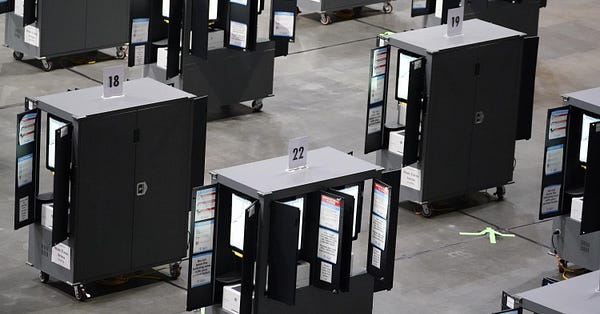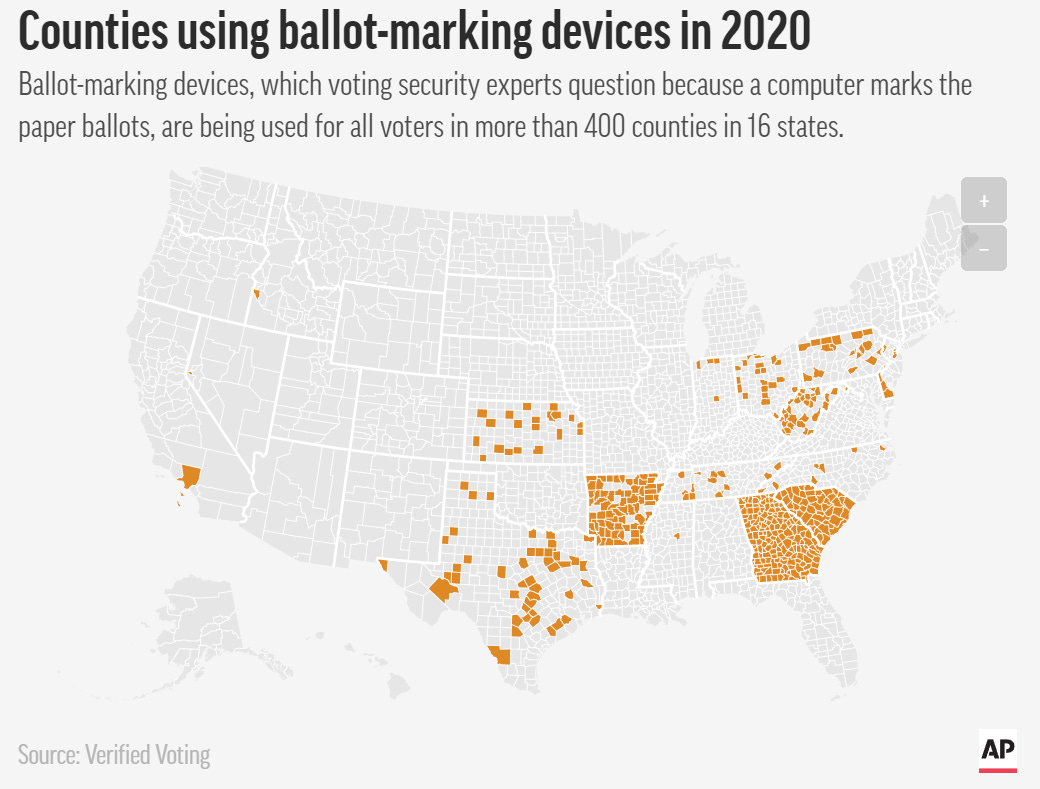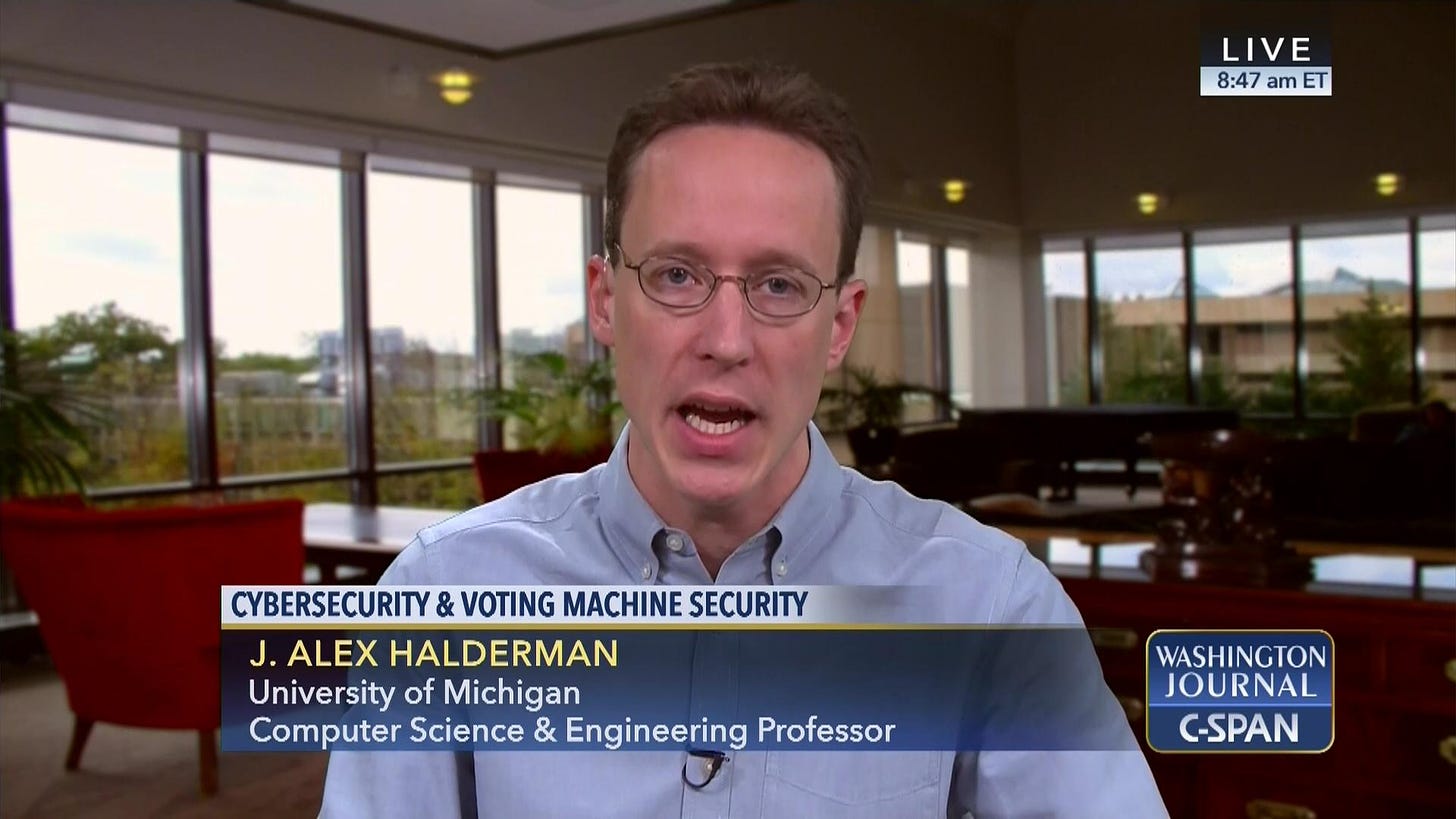Jeff Lenberg: Dominion's Erroneous Code and Unsolved Anomalies
Former Sandia National Laboratories engineer, Jeff Lenberg, appeared on "Conservative Daily" to discuss the EAC's report in Williamson County, Tennessee, and his findings from Coffee County, Georgia.
In a podcast episode, released last Friday, former Sandia National Laboratories engineer, Jeffrey Lenberg, who developed satellite systems and tested software for the U.S. Department of Energy, appeared on the “Conservative Daily” podcast to discuss the Election Assistance Commission report on Dominion’s “erroneous code” in Williamson County, Tennessee and a ballot scanning anomaly discovered in Coffee County, Georgia.
Lenberg showed a report entitled, “Dominion Voting Systems D-Suite 5.5-B” which was released on March 31, 2022, after an anomaly was observed in Williamson County, Tennessee during a municipal election held on October 26, 2021, regarding Dominion’s Image Cast Precinct (ICP) tabulators.
“There was some very bad misbehavior of the equipment that was found only because a poll worker was keeping a tally on a post-it note,” Lenberg told Conservative reporter Brian Lupo.
“They noticed that the ballot count on the machine didn’t match what they put in the machine. It was missing many ballots that they knew went into the machine. So they raised the alarm,” he continued.
After further investigation, the election officials discovered that seven out of eighteen machines had this same problem where a large number of ballots were fed through the tabulator, but not reported as counted when they closed the polls.
The State of Tennessee ran its own investigation and was able to repeat the problem so the Election Assistance Commission (EAC) and the two accredited entities that test voting machines, Pro V&V and SLI Compliance, were brought in to run an investigation on January 19, 2022.
Lupo commented, “Which by the way is a huge conflict of interest because they already paid them and they certified it. So if there is anything wrong with these machines, they’re complicit.”
Lenberg, who has published reports on voting machine vulnerabilities, agreed that independent analysis was necessary and said, “During their testing, they could repeat it. They saw the same sort of bizarre behavior where you put ballots in and a bunch of them just get rejected and don't get counted.”
The EAC, Pro V&V, and SLI Compliance were able to repeat the problem, but they were not able to figure out the cause of the anomaly so they called Dominion Voting Systems.
“Right there is a problem. What do you do? Well, what you do is you go get some independent experts or your own team and dig deeper until you find out the cause of the anomaly. You don’t just say we couldn’t find it so we asked Dominion to look at it,” Lenberg said.
He continued, “How can you have the voting machine company figure out if there is a problem with their system or not? There's a huge conflict of interest there.”
Senator Ron Wyden, Democrat-Oregon, March 21, 2018:
“Forty-three percent of American voters use voting machines that researchers have found have serious security flaws including backdoors. These companies are accountable to no one. They won’t answer basic questions about their cyber security practices and the biggest companies won’t answer any questions at all. Five states have no paper trail and that means there is no way to prove the numbers the voting machines put out are legitimate. So much for cyber-security 101… The biggest seller of voting machines is doing something that violates cyber-security 101, directing that you install remote-access software which would make a machine like that a magnet for fraudsters and hackers.”
Senator Amy Klobuchar, Democrat Minnesota, 2020 HBO Documentary:
“We’re very concerned because there are only three [voting machine] companies. You could easily hack into them. It makes it seem like all these states are doing different things, but in fact, three companies are controlling them.”
Nevertheless, on February 11, 2022, Dominion submitted a Root Cause Analysis (RCA) report to the EAC, who subsequently concluded that “the direct cause of the anomaly was inconclusive” followed by a statement saying that “erroneous code is present in the EAC certified D-Suite 5.5-B and D-Suite 5.5-C systems.”
“There are two insanely huge phrases there,” Lupo commented. “The first is erroneous code. Erroneous code is the first one, but the second one immediately following it is EAC certified. So does the certification mean anything?”
“How do you get past that when you tell us the EAC inspects these machines, the EAC certifies them, and then in the very same sentence you say there is erroneous code that causes this major malfunction,” Lupo asked. “Like you said earlier, Jeff, this was only caught because somebody was taking a tally on a post-it note.”
Lenberg replied, “That's why this stuff should have been caught in testing. This is testing 101. If there is erroneous code there, if the certification authorities had done their job, they should have found this.”
He continued, “But the description of it gets very bizarre. It says it's due to a misread of the QR code. Stop right there. A misread of the QR code?”
Lenberg explained that QR codes are very difficult to misread because they have an error detection feature that enables them to function even if there is a distortion, dirt, or damage covering 15% to as much as 30% of the code.
He remarked, “There’s nothing in here about fixing the misread or even figuring out why it misread. They just said it misread. That’s the root cause. I mean, this is just totally unacceptable as a root cause analysis.”
Lenberg, who spent thirty-one years working as an engineer working on national security projects with a high-level security clearance, explained that the report did not even determine if it was the scanner that misread the QR code or if it was the voting machine that misprinted the QR code.
“We have to have independent election investigators who can figure this stuff out and will get to the bottom of these things because what we got now is unacceptable. I mean that’s their process?” he asked.
“From what they wrote there, I would say they have no idea what the problem was.”
“In fact, I would say from the behavior in Tennessee, I’m wondering if someone hacked the system, and the fact that they came out with that ICX bulletin saying the ICX is vulnerable after that, the conclusion might be that someone actually hacked into that election and modified it,” Lenberg explained citing a May 2022 report released by the U.S. Cybersecurity & Infrastructure Security Agency (CISA) entitled, “Vulnerabilities Affecting Dominion Voting Systems ImageCast X”.
Professor J. Alex Halderman, University of Michigan, Computer Science:
“I know America’s voting machines are vulnerable because my colleagues and I have hacked them repeatedly as part of a decade of research studying the technology that operates elections and learning how to make it stronger. We’ve created attacks that can spread from machine to machine like a computer virus and silently change election outcomes. We’ve studied touch screen and optical scan systems and in every single case we’ve found ways for attackers to sabotage machines and steal votes… In close elections, an attacker can probe the most important swing states or swing counties, find areas with the weakest protection, and strike there. In a close election year, changing a few votes in key localities could be enough to tip national results.”


In the May 2022 report, CISA, an arm of the Department of Homeland Security, disclosed nine vulnerabilities that “an attacker could leverage to install malicious code” on the very same Dominion ImageCast X machines that are used in Williamson County, Tennessee.
What’s worse, nearly 1 in 5 U.S. voters in more than 400 counties across 16 states used these same machines, which are also called “ballot-marking devices”, to cast their votes during the 2020 election.
Including key counties in Pennsylvania, Ohio, North Carolina, much of Texas, and all counties in Georgia, Delaware, and South Carolina.
This occurred despite the fact that many election security experts previously warned against the use of ballot-marking devices, which print a paper ballot that includes a human-readable summary of the voter’s selection and a barcode or QR code that is read by a scanner to tally the votes.
They argued that the machines make elections more vulnerable to tampering because voters cannot read the barcode or QR code to verify that it accurately reflects their selections, but hackers could potentially manipulate these codes to flip votes, according to the Associated Press.
Georgia’s election officials ignored these warnings and awarded a $107 million contract to Dominion Voting Systems in 2019 to install 30,000 ImageCast X machines across all of Georgia’s 159 counties for the 2020 election.
In December 2020, election supervisor Misty Hampton in Coffee County, Georgia posted the following video online demonstrating how system administrators can change votes using the Dominion Voting system software:

On election night, Hampton was unable to run batches of ballots through her scanner without the machine jamming.
After a Coffee County board member notified Dominion Voting Systems, the company’s technicians were able to fix the scanner without ever touching the equipment.
Lenberg said, “Now, you have to understand, she did not allow them to go anywhere near the equipment. It was secure, no one could get at the machine, and the machine was not supposed to be networked in any way. They said, we really think it's going to work this time. Just go try it one more time. So she went in and it worked perfectly.”
Lenberg looked up the model number of the machine and confirmed that the “motherboard had Bluetooth and Wi-Fi built-in”.
“Now, any logical reasoning person would realize that they must have done something to fix it remotely,” Lenberg concluded.
Lupo asked, “are the Dominion reps that somehow fixed this just by talking on a cell phone being investigated for remotely accessing the voting machine?”
Lenberg responded, “Not at all, so that's one of the big problems, what the investigators, the state, and the feds are doing is investigating the investigators, they don't investigate the anomalies. There are a bunch of anomalies that need to be investigated by competent people and they are not being investigated. The state should have been in there saying how in the world did they reconfigure this machine?”
Furthermore, in Georgia’s Fulton County, 20-year election worker, Susan Voyles, also testified that Dominion Voting Systems employees “operated remotely” on her ballot-marking devices and poll pads during the 2020 election after her team experienced technical problems with their machines.
Dominion Voting Systems, which is the second-largest U.S. election machine vendor, has given public presentations acknowledging their use of modems in their voting machines:
Moreover, NBC News reported ten months before the 2020 election that ES&S, the largest U.S. election machine vendor, had installed at least 14,000 modems connecting their voting machines to the internet even though many election security experts had previously warned that voting machines with modems were vulnerable to hackers:
After problems with the voting machines during Georgia’s January 6th, 2021 run-off election for U.S. Senate, Misty Hampton and other county election officials brought Jeffrey Lenberg and others in to look at what happened.
Hampton created approximately forty ballots on Georgia’s official ICX ballot marking devices. Those ballots “just like the ones you would have on the night you voted” were run through the ICC (Imagecast Central) scanners “literally thousands of times”.
“The scanners were reversing ballots. I think it was like 15% or something. And, they were reversing ballots 4 to 1 for Trump. So approximately four times as many Trump ballots versus the number of Biden ballots were being reversed,” Lenberg said.
Lenberg explained that the voting machines had a built-in feature that allowed the administrator to adjust how the scanner scanned, “you could go in and change like ten different parameters like gamma, contrast, and sensitivity,” he said.
“If you have a certified piece of equipment that's counting votes you don't want to let an administrator go in and adjust how it's going to scan votes and yet the capability was there. You would never put that into a secure voting machine,” he added.
Lenberg observed as Hampton adjusted those parameters that ballots ran perfectly through the machine “until we got to the about the tenth parameter and the specific parameter was they had this thing in there that said you could ignore red, ignore blue, ignore green, or none — and it was defaulted to ignore red.”
Now, why was that in there? Sometimes election officials need to mark on a ballot and they use red. So, the software has the ability to ignore red marks and it’s defaulted to that.
Although, there were no red marks on the ballots, when Hampton “turned off that feature and turned it to none”, the tabulator went back to the mode of operation that “would run twenty Biden ballots through with no problem, but it would not run twenty Trump ballots through without stopping,” Lenberg said.
Lupo asked if Georgia was investigating the problem with their scanners to which Lenberg replied:
“The tactic all across the country is go after the investigators. Don't investigate the anomalies, don't investigate the problems, investigate the investigators, and it's a fear and intimidation tactic and they've done it across the board. They did it with Tina Peters, they did it with Couy Griffin. They are trying to set examples in every area, a county recorder in Colorado, county commissioner in New Mexico, technical experts and lawyers up in Michigan, at Mar-a-Lago an ex-president. We are going to set the example here that if you speak up, if you question anything that's contrary to the official government stance, then you are a bad guy, and we are going to come after you.”
Lupo commented on articles released last week by the Washington Post, CNN, and Forbes among others which frame Lenberg as a criminal for investigating these unexplained anomalies even though he was authorized by county election officials:
“We need to establish here that Misty does have the authority to do everything that she did. When they say this term that you guys breached the system, which you guys didn't. It’s not breaching, breaching implies that there's no authority to go into where you are going. This was an open door, this was a door opened by the authority that had the right.”
“We actually didn't touch the equipment,” Lenberg replied. “Misty and another helper, they ran the equipment, they ran the test. All the testing, all the equipment was operated by the local certified election officials there.”
Lupo explained that Georgia’s Governor Brian Kemp and Secretary of State Brad Raffensperger argued in a November 2020 court case that “the secretary of state has no lawful authority over county election officials citing Jacobson v. Florida Secretary of State (11th Cir. 2020).”
“So when WaPo [Washington Post] put out these articles saying that you guys breached their system and saying there was a criminal probe — this is beyond a witch hunt,” Lupo concluded.
To which Lenberg responded, “I'm not a lawyer, but it seems to me that the county had every reason and authority to bring in a team to look at what happened and that is what they did.”
Lenberg added, “The state should have been in there running their own investigation, and instead now they are going after the people who tried to figure out what was going on and that's not right.”
Jeffrey Lenberg, Sandia National Laboratories (31 years), Engineer:
We got to find a much more secure way to count our ballots. We have a very insecure system. The big lie is that we have a secure system. We have an election system that is made of swiss cheese, but they are not saying that, they are lying about it, saying that we have a great election system, and it's super secure and wonderful. Sixty percent of Americans don't trust the election system right now. Well that's broken. If sixty percent don't trust the election system, we are in big trouble because it's the only thing that stands between us and tyranny. If we don't have a functional, safe, secure election system then tyrants take over — they literally control the country. I'm not on Trump's team. I'm just trying to get to the bottom of this to figure out if we have problems with our machines or not. And, the more I've looked, the more obvious it becomes that we do.









Mike Lindell has it right: get rid of the voting machines and use only paper ballots counted by hand.
This is blatantly intentional. Dominion's security practices violate every Computer Science 101 and election standard. A broken system should be randomly accurate - i.e. 50/50 Republican/Democrat. The fact that it doesn't err on the side of Trump or MAGA candidates is further proof. Add to that the unhinged far-left anti-Trump VP of Dominion and it's a no-brainer. These machines, violate Federal Election Law, and subsequently every down-ballot election is compromised going back years - not just the Presidential elections.
Thank you for doing the research and work of the legacy media, Kanekoa. God Bless!